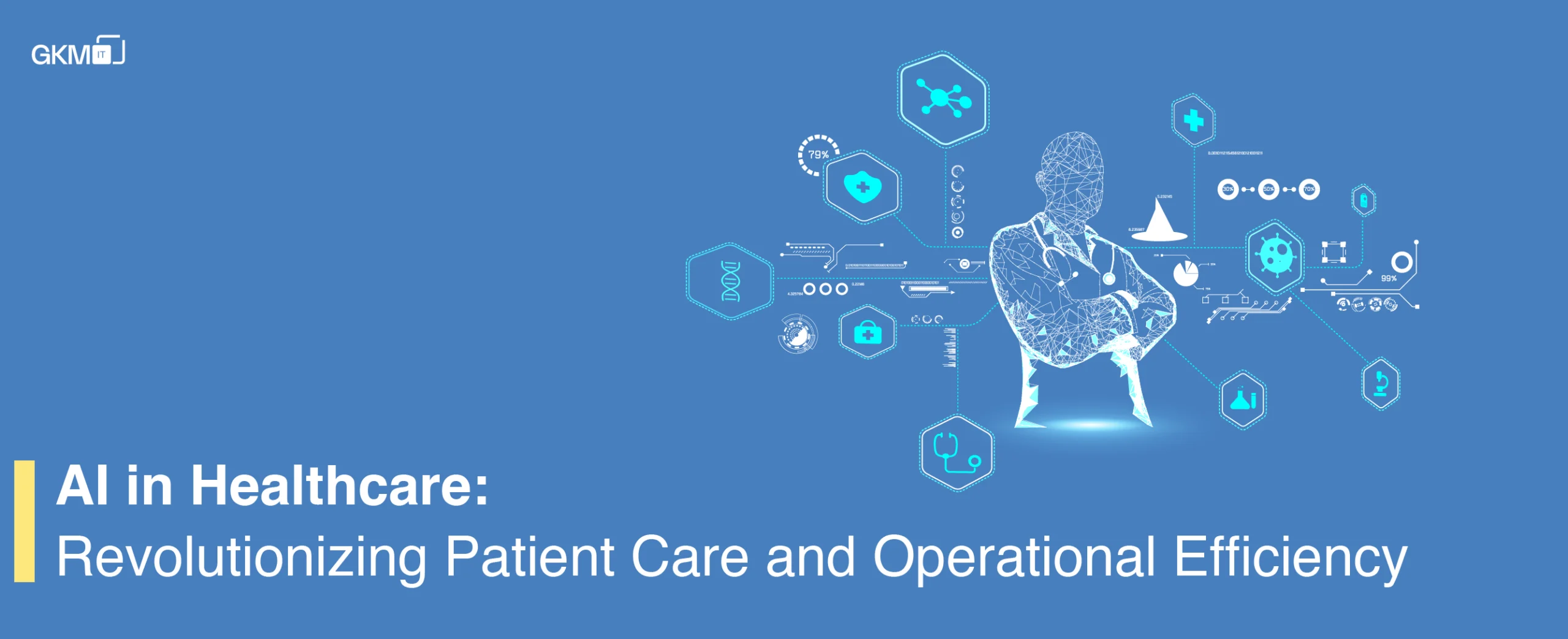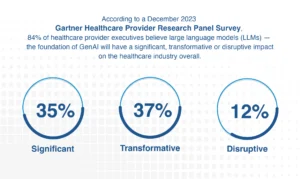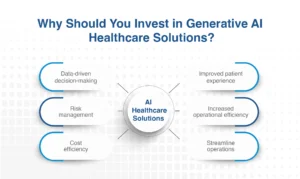
AI in Healthcare: Revolutionizing Patient Care and Operational Efficiency
In a rapidly growing digital world, AI (artificial intelligence) is playing a key role in changing the healthcare industry.
From determining the diagnosis of diseases to improving patient care and optimizing administrative processes, thus transforming our worldwide health practices.
But how exactly is AI improving healthcare, and what does the future hold for patients and healthcare providers? Let’s explore
GenAI in Healthcare
GenAI technologies are key enablers in healthcare; they process both structured and unstructured data, generate personalized patient treatment plans, simulate clinical trials, and create training materials for HCPs, which improve clinical outcomes and patient trust.

GenAI is an assistant, not a replacement.
GenAI is not here to replace healthcare professionals but rather to enhance their individual capabilities and make their work more efficient. GenAI offers support in data-driven insights, decision-making, and administrative operations; however, HCPs remain at the forefront of patient interaction and clinical decision-making.
Influence of Artificial Intelligence on Patient Outcome and Operational Efficiency.
- Faster diagnosis:
Artificial intelligence supports healthcare professionals in making accurate diagnoses, which facilitates timely treatment and enhances operational results. However, biases present in generative artificial intelligence may result in inequitable outcomes in personalized patient care. Therefore, it is necessary to focus on fairness in AI to guarantee that all patients reap the benefits of these systems.
- Enhanced communication with patients:
AI-powered virtual chatbots and assistants improve collaboration, manage queries, and guide patients through diverse treatment alternatives for personalized treatment.
- Predictive healthcare and preventive measures:
AI technologies in healthcare are key tools in determining potential issues faced by patients before they arise, leading to proactive treatment and reduced hospital readmission rates.
Why Should You Invest in Generative AI Healthcare Solutions?

- Data-driven decision-making:
Artificial intelligence in healthcare turns vast data into actionable insights within seconds, which can help decision-makers make smarter and more informed choices. From patients’ histories and medical records, healthcare leverages GenAI to get key insights to support strategic planning and improve the accuracy of patient care and choices for operations.
- Management of risk:
With applications of AI in healthcare, you can efficiently predict potential healthcare issues earlier. HCPs can examine historical data and determine patterns of demand to develop preventive patterns and improve patient safety.
- Cost efficiency:
Automating diverse administrative tasks helps decrease operational costs and significantly improve the productivity of HCPs. From extracting patient data to setting up new appointments to managing clinical documentation, GenAI can automate such tasks that save cost and improve patient care experience.
- Improved patient experience:
The healthcare companies can take patient care and experience to the next level by using diverse tools such as chatbots and virtual assistants powered by GenAI in the healthcare system. The healthcare industry can personalize care plans, which improve the engagement of patients, satisfaction, and healthcare operational outcomes.
- Enhanced operational efficiency:
Various tasks HCPs perform in their daily activities, from patient data entry to managing diverse paperwork. GenAI significantly saves healthcare professionals time and effort. With GenAI, you can streamline routine work, decrease manual workload burdens, optimize resource allocation, and ultimately improve the productivity of healthcare organizations.
- Streamline operations:
GenAI can examines vast data, generates synthetic medical insights, predicts disease patterns, and automates diverse tasks, helping healthcare organizations streamline work and enhance patient care.
Ethical Considerations
Data quality and availability:
To offer security to patients’ autonomy during decision-making, AI models need to be transparent related to how they process data to explain their predictions. AI in healthcare specializes in diverse areas, such as EHRs, diagnostic tools, and telemedicine platforms.
Regulations:
It is necessary to have clear regulatory frameworks to ensure AI in the healthcare industry is utilized safely, including the role of the FDA and other governing bodies. The AI system require to be precisely documented and offer clear insights to the users for making key decisions.
Data privacy and security:
Healthcare companies need to efficiently resolve the issue of patient information safety and the significance of adhering to regulations such as HIPAA. It is necessary to ensure that there is no misuse or leakage of these data as it could have devastating consequences or the privacy of patients.
It’s Only the Beginning of What AI Can Offer Healthcare.
The future of patient care and hospital efficiency will benefit from the advancement in AI. As artificial intelligence in healthcare continues to change in a competitive world and integrate seamlessly into healthcare procedures. Healthcare companies can expect enhanced patient outcomes, streamlined operations, and reduced costs.
By taking full advantage of the future of AI, healthcare companies can look forward to a future where patient care is highly personalized and effective than ever before.
Related Blogs:
Enhancing Patient Care Through Healthcare Business Intelligence
Generative AI and The Future Of Personalized Healthcare